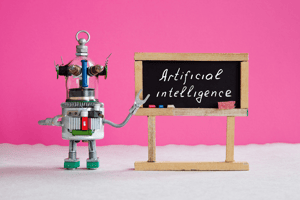In 2014, the Australian government committed to reaching AA standards of the Web Content...
Why relationship based learning is the future of digital education (and how it’s transforming student outcomes fast)
Recently, Oppida’s Founder and CEO Bianca Raby sat down with Anthony Morris, the co-founder of Cahoot Learning to discuss digital education. Cahoot Learning works with professional institutions, large enterprises, government entities, and universities to deliver on their strategic educational initiatives at scale and with impact. They specialize in relationship based learning which is where interview kicked off.

Bianca: Good morning Anthony, thank you so much for joining me. I would like to start by asking what made you and Errol build Cahoot Learning on relationship based learning?
Anthony: So, it was the gaps that we saw in education in general and it wasn’t just about digital education. It was also including face-to-face education. Now, our focus is the professional education world. So that’s the context of this, not undergraduate. This is purely in the professional education space. But what we saw lacking in that is that we’d have a group of people coming into a course of some description, who’ve got experience, knowledge, and lots to offer into that course.
It’s not just about the content expert in that course. And as a community, we saw that they were ignored. We thought that was a real shame in terms of the potential of what that group could have actually held for that course and how the learning outcome would have been way stronger if there had been a way to extract that.
So, Cahoot Learning wanted to be able to bring a community together, where all the voices could be heard, and all the experience and all knowledge from that group could actually be part of that core course structure and experience. That's where the idea of building on relationship based learning came from.

Bianca: Awesome. Love it! So how do you think Cahoot Learning raised the bar in student experiences and outcomes since you’ve launched?
Anthony: So, being able to build a platform, our own platform, our own code base, we just had that focus of, “How do we build relationship based learning?”, “How do we build trust in the community?”, and so on. So, the tool itself has been totally pointed to that end goal. And therefore, for the development we do—and again, the focus of that is around making that stronger. And we’re by no means there yet.
It’s an ongoing process of how we continue to evolve. But then, when you combine that with, say, design perspective, where the design also then supports that sort of relationship based learning model, what we see are different outcomes to traditional approaches. The efficacy of the relationship based learning model of education is incredibly strong. The learner experience becomes sticky. People actually start supporting each other.

There’s a real community bond that starts to occur. They’re all trying to support each other over the line. But then, the actual quality of the learning; the experiences that the cohort has; the way that they’re applying the course concepts; and the different perspectives they have about that content; that all creates a wonderful melting pot.
Relationship based learning results in shifts in their capability, their mindset, so the quality of the whole program goes up quite remarkably.
Bianca: Yes, fantastic. Because I mean, for me, during the MBA, that was one of the biggest things: my network and the people that I was doing it with. That’s how we got through. I mean, we were in the trenches together and that was very much a community feel.
And there were days and days in those syndicate rooms where we would be forced to really get to know each other. That’s what online places and courses sometimes miss. So, it’s really great that you guys have come up with a way to integrate relationship based learning in the virtual environment.
Anthony: Yes. And it seems that MBA stories—and we’ve heard many—from people all over the world when asked, “What was the best part about your MBA?” They say, “The community, the relationships”.
Bianca: It really was the community.
Anthony: It’s the people in it. It wasn’t the content. It wasn’t the subject.
Bianca: Yes. Not always, No. I remember there was one group where we got particularly close. I think it was five consecutive days, and we were doing a simulation. And so, we were in that room together for thirteen hours a day: you just really get to know each other and help each other through.
Anthony: I think that in the context of the global challenge of education at the moment, and what we’re trying to solve as a society, that’s really important—that relationship—and that’s what we’re finding. In a hyper-connected world, relationships actually get left aside and connectivity becomes very shallow.
As much as we’re more connected than ever, that real connectivity (in relationships) gets pushed to the side and that’s what we’re seeing in education. A big focus on scale and access, but quality—actual true learning that shifts capability and mindsets we talked about—that’s actually not being addressed in current models. Relationship based learning aims to fill that gap.
Bianca: Couldn’t agree more. So, I guess that leads to my next question. What do you see the biggest challenge is for online education in Australia specifically?
Anthony: Biggest legacy, I would say. And in Australia, if we look specifically at Australia, we’ve got—we’ll call it a love affair with the international students …
Bianca: Oh, it’s true.
Anthony: … And it’s bringing a massive revenue in. International students heading international education. I think it’s the highest revenue earner in Victoria, plus one of the second or third highest nationally. We are absolutely wedded to that and I think it’s stopping education more broadly in Australia from being more innovative.
Instead of focusing on, “How do we export our Australian model of education to the world?”, we are looking at how we are bringing the world here. As opposed to how we go out to the world. I think that’s our biggest problem. It’s that legacy…
The other issue is the focus for the international student is the undergraduate degree, a 3 or 4-year period when the real opportunity, or need, as I see it is in our education model for the 22 to 82-year-old. How we educate ourselves for life is what the world needs to solve.
Bianca: This is a really interesting perspective.
Anthony: So, I don’t think it’s capability. I don’t think it’s desire. I think we’re really too comfortable with that current situation and the revenue it’s bringing which is not going to last.
Bianca: No, and we’re already seeing the signs that it’s not lasting. We’re seeing a drop, but probably not enough to evoke action, unfortunately.

Anthony: The heat in the kitchen is not yet hot enough to warrant change and so, we’re seeing formal education in Australia is very wedded to its current model.
Bianca: Yes. And lastly, what are you most excited about with digital education because that’s one thing we speak a lot about at Oppida is how excited we are about the possibilities of digital?
Anthony: Digital has the opportunity, and we see it every day already, that it surpasses class-based education, face-to-face models of education. It actually supersedes and leapfrogged it entirely. It’s always been the poorer cousin being, “Oh, you do digital when you don’t get a chance to do face-to-face.”
That’s not the case. We see much stronger data on capability and possibility in digital than we ever have before. And we need that because we’ve got a massive challenge. We get this shift. We call it the Fourth Industrial Revolution, but it’s evoking massive shifts in workplace capability as required as a lifelong learning process.
This isn’t about a three or four-year degree. This is actually about the education over a lifetime, and that lifetime is expanding dramatically in terms of the way we’re going to be working. We’ve got this shift, this curve going on as an exponential change in a society driven by technology.
Our ability to adapt to that is not quite flatlined, but it’s going up at a very slow, steady rate. Digital education gives us the opportunity to meet that same curve with a massive shift in the way that we educate and the way that we see education as a lifelong process. That really excites me and that’s what we are creating at Cahoot Learning and focusing on relationship based learning.
Bianca: Yes, you are.
Anthony: The capability of that is massive and we need it.
Bianca: Absolutely. And that’s why I think, straight away in our first conversation, we bonded so much because that’s exactly what we’re all in the game for. So, well done and thank you for doing what you do with Cahoot Learning up until now and can’t wait to see you keep going into the future with more and more focus on relationship based learning.
Anthony: Yes, thank you. It’s fun. It’s actually really, really good fun to do.



